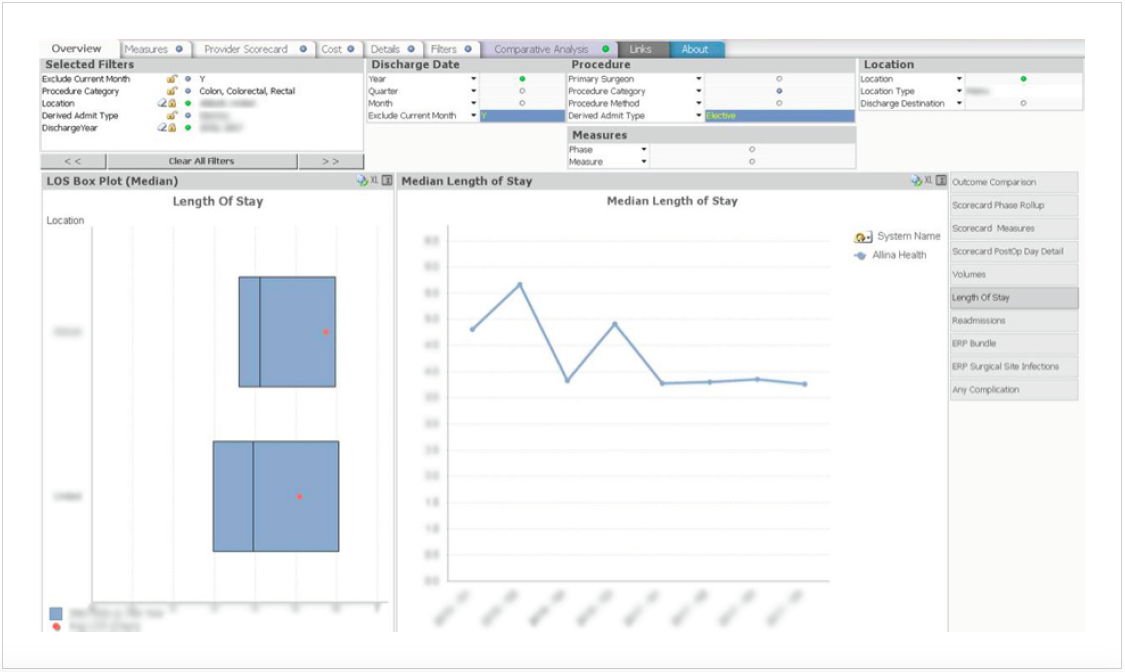Allina Health implemented an Enhanced Recovery Program (ERP) for patients undergoing elective colorectal surgery, aiming to reduce hospital stays, lower costs, and decrease the incidence of surgical site infections. To monitor performance, Allina developed an ERP analytics application featuring a dashboard that effectively visualizes the results from the first year of the program.
Contemporary colorectal surgery is often associated with long LOS, high costs, and surgical site infections (SSI) approaching 20 percent. Much of the LOS variation is not attributable to patient illness or complications, but most likely represents differences in practice style. Successfully reducing SSI requires a multimodal strategy under the supervision of numerous providers with high compliance across the spectrum.
Allina Health was using established, evidence-based clinical guidelines, yet clinical variation remained high across pre-arrival, preoperative, intraoperative, and postoperative care areas, leading to substantial variation in LOS, cost of care, and the patient experience. To ensure greater consistency, Allina Health developed an enhanced recovery program (ERP) for patients undergoing elective colorectal surgery, which built standard protocols into the EHR to address elements of care from pre-arrival through post-discharge. The ERP improvement team included physician champions, operational leaders, infectious disease clinicians, and RN coordinators who help shepherd patients through the various care pathways, and ensured that ERP interventions were successfully completed.
To facilitate the program and monitor performance, Allina Health developed an ERP analytics application with an administrative dashboard to easily visualize first-year results.
Contemporary colorectal surgery is often associated with long LOS: eight days for open surgery and five days for laparoscopic. Much of the variation in LOS is not attributable to patient illness or complications, and most likely represents differences in practice style. Furthermore, colorectal surgery is high-cost, with rates of surgical site infection (SSI) that approach 20 percent.1,2 Strategies that successfully decrease SSI are multimodal, occur across a range of settings, and are supervised by numerous providers. Ensuring high compliance with these strategies is crucial to the success of SSI reduction efforts.3
A not-for-profit healthcare system, Allina Health is dedicated to the prevention and treatment of illness and enhancing the greater health of individuals, families, and communities throughout Minnesota and western Wisconsin.
Allina Health has always been committed to data-driven process improvement, regularly identifying opportunities to better patient outcomes, reduce variation, and reduce cost. Allina Health was using established, evidence-based clinical guidelines in its care of elective colorectal surgery patients, yet clinical variation remained high across pre-arrival, preoperative, intraoperative, and postoperative areas. As part of its process improvement efforts, Allina Health identified variation in the management of these patients, which was leading to substantial differences in LOS, cost of care, and the patient experience.
Lack of care coordination was contributing to the increased cost, as was a lack of standard practices, particularly in three areas:
Although aware of these challenges, and aware that the variation could likely improve, Allina Health lacked specific, timely data for patients undergoing elective colorectal surgery that could be used to identify the sources of variation. The organization lacked data around the process measures contributing to LOS, cost of care, and the patient experience, making it difficult to take a data-driven approach to improvement.
Allina Health needed to develop a strategy that would ensure consistent care pathways for patients undergoing elective colorectal surgery, improve outcomes, and decrease LOS.
To improve the care pathway for patients undergoing elective colorectal surgery, Allina Health established an enhanced recovery program (ERP) for these patients. The ERP is a multimodal, evidence-based approach using standardized protocols built into the EHR to address pre-arrival, preoperative, intraoperative, and postoperative elements of care.
Implementing ERP elements is facilitated by a dedicated improvement team, and dedicated registered nurse (RN) coordinators and clinical nurse specialists, who help shepherd patients through the various care pathways, ensuring the successful completion of ERP interventions. Team membership include key physician champions, operational leaders, RNs, and infectious disease clinicians. The improvement team meets regularly to discuss program progress, outliers, and potential improvements to remain current with the latest evidence-based guidelines.
ERP interventions are designed to reduce surgical stress, maintain postoperative physiological function, and enhance mobilization after colon or rectal surgery, resulting in superior postoperative outcomes, including LOS and SSI rates, in the elective colorectal population.
The program included standard evidence-based interventions performed across all four phases of care:
In addition to implementing ERP and standardizing the care processes for patients undergoing elective colorectal surgery, Allina Health implemented evidence-based SSI prevention bundles. To monitor their effectiveness and to identify opportunities for improvement, Allina Health used the Health Catalyst® Analytics Platform, including the Late-Binding™ Data Warehouse and broad suite of analytics applications. They leveraged professional services from Health Catalyst to develop an ERP analytics application (see Figure 1) giving them easy access to specific information in support of this improvement effort.

The ERP analytics application provides easy visualization of performance. Allina Health can drill down to individual patient, unit, or provider level performance data, including data for infection prevention activities, order set utilization, bundle compliance, and outcome measures, such as SSI rate, LOS, and readmission rate. The dashboard provides administration, physician leaders, nurse managers, and RN coordinators insight into which elements were consistently utilized, and insights into care gaps, enabling leaders to monitor compliance and provide ongoing coaching and feedback to caregivers.
The analytics application is also used to give physicians their specific performance data and patient outcome data, including a comparison of their performance to other physicians.
The ERP positively impacted patient outcomes and LOS for patients undergoing elective colorectal surgery. In one year, the program achieved significant results:
Allina Health will use the analytics application to evaluate the impact of specific ERP interventions on patient outcomes, enhancing its understanding of which activities are key to achieving the desired outcomes. Additionally, Allina Health plans to expand the ERP for elective colorectal surgery systemwide. Once that is accomplished, the ERP will be applied to other elective surgeries with the goal of improving patient outcomes, reducing SSI rates, and further reducing LOS and cost across the system.




